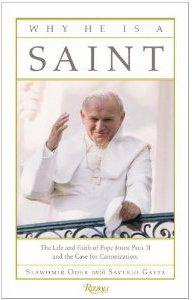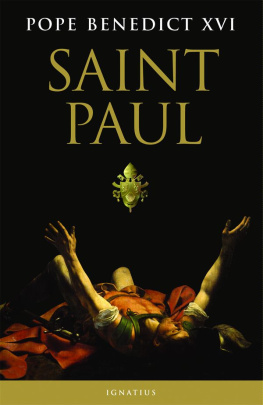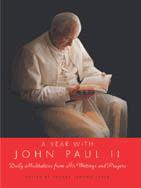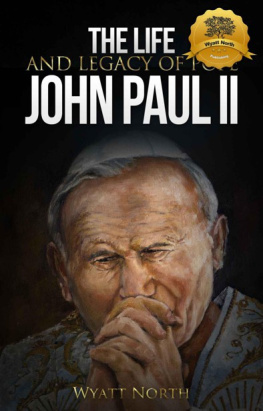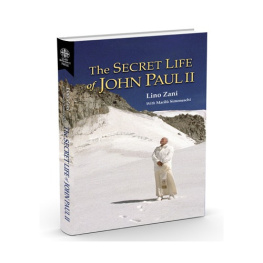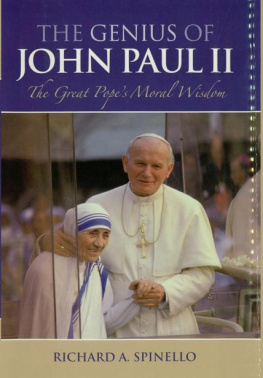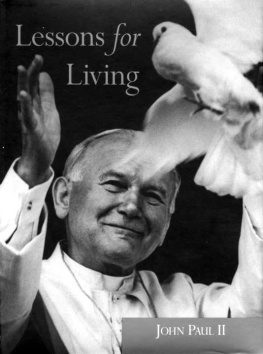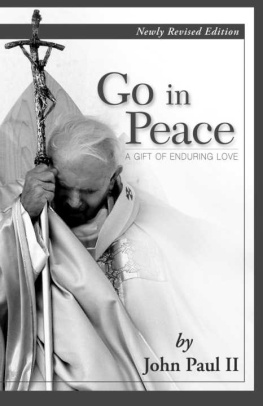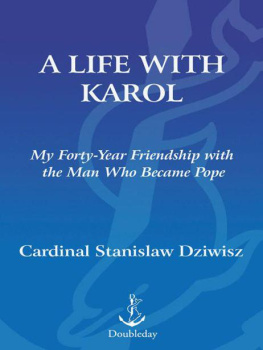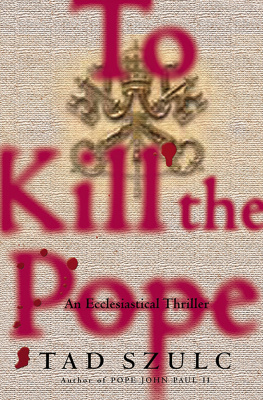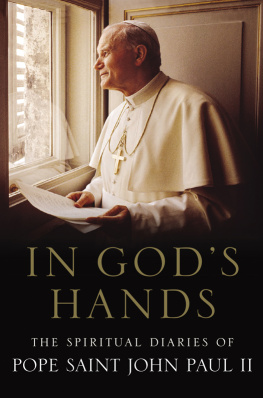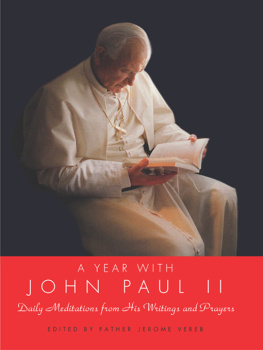
WHY HE IS A SAINT
SLAWOMIR ODER WITH SAVERIO GAETA
Translated by Antony Shugaar
First published in the United States of America in 2010 by
Rizzoli International Publications, Inc.
300 Park Avenue South
New York, NY 10010
www.rizzoliusa.com
Originally published in Italian as Perche e Santo in 2010 by RCS Libri S.p.A.
CONTENTS
Faith in Flesh and Blood "Uncle" Karol The Priest Born from the Ashes of an Actor Undercover in the Seminary The Phantom of the Double Homicide In the Service of God and of His People With His Arms Extended in the Sign of the Cross Totus Tuus All in the Light of Faith The Lessons of Vatican II Reconciling Culture and Pastoral Duties In the Chill of Nowa Huta In the Sights of the Polish Intelligence Service A Fiery Sermon The Bells of Pope Paul VI The Prophetic "Habemus Papam"The Second Home of the Poles A Pole on St. Peters Throne Choosing His Colleagues A Firmness Underpinned by Humility "II Will Take Blood to Convert" . The "Open Letter" to Ali Agca "Open the Borders of the States" The Collapse of Communism I lie Heir to St. Paul. In the Worlds "Hot Zones" A Matchless Magisterium In Dialogue with the Other Faiths "There Is No Place in the Church for a Pope Emeritus" The Fathers Return HomeTraveling Up the River to Its Source Blessed Are the Poor The Essential as a Form of Liberty A Creative and Poetic Body of Thought Illuminating the Path with the Fire of Prayer A Utility Closet as a Chapel With a Heart Devoted to His Homeland Taking Inspiration from the Saints for the Practice of Virtues The Prediction of Padre Pio In "Conversation" with the Virgin Mary "If I Weren't Pope, I Would Already Be in Medjugorje Confessing" In the Sign of Suffering The Stations of the Cross in the Hallway
O Blessed Trinity, we thank you for having graced the Church with Pope John Paul II and for allowing the tenderness of your fatherly care, the glory of the cross of Christ, and the splendor of the Holy Spirit to shine through him.
Trusting fully in your infinite mercy and in the maternal intercession of Mary, he has given us a living image of Jesus the Good Shepherd and has shown us that holiness is the necessary measure of ordinary Christian life and is the way of achieving eternal communion with you.
Grant us, by his intercession, and according to your will, the graces we implore, hoping that he will soon be numbered among your saints. Amen.
Prayer for Graces
Through the Intercession
of the Servant of God
the Pope John Paul II
Preface
THE UNKNOWN FACE OF JOHN PAUL II
One day, a nun serving in the papal apartments noticed that John Paul II seemed unusually fatigued. She shared her concern with him, telling him that she was "worried about Your Holiness." "Oh, I'm worried about my holiness, too," was the pope's cheerful and immediate response. Now that the cause for the beatification of Karol Wojtyla is progressing to its natural conclusion, that concern has proved to be unfounded. His virtuesfaith, hope, and charity; but also prudence, justice, strength, and temperance; and, further, chastity, poverty, and obediencehave emerged in all their dazzling completeness thanks to the testimony of those who took part in the canonical process.
It is in fact not sufficient, by the standards of the Catholic Church, to establish the so-called fama sanctitatis (reputation for holiness), the widespread belief among the faithful that a candidate deserves canonization. That belief was, of course, unmistakably expressed in John Paul II's case by the Santo subito! signs, calling for immediate sainthood, that proliferated in St. Peter's Square on the very day of his funeral. Even the required miraclea necessary condition, considered the "seal of God"took second place, coming into consideration only once the verdicts of theologian-consultors, the consensus of cardinals and bishops, and the signature of the new pope had certified the possession of Christian virtues to a heroic degree.
That stage of the process is reached only after a meticulous investigation by the ecclesiastical tribunal, which refuses to settle for generic declarations of esteem and veneration, however prestigious and respected the witnesses in question may be. Instead, it conducts close and thorough questioning and demands concrete evidence, detailed descriptions of specific events, and documentary confirmationall elements that provide incontrovertible proof of the credibility of the statements. In such a context, it becomes the responsibility of the postulatora kind of "defense attorney" for the candidate for sainthoodto bring to light the episodes that most effectively serve to certify the authenticity of the events in question.
In many cases, these are stories that have never before been told. The reason they emerge in the context of these hearings is that the witnessesonce the candidate for sainthood is deadnow feel free to recount occurrences and events that they had previously preferred to keep to themselves. The postulator is therefore entrusted with a series of reports, anecdotes, and fioretti (literally, "little flowers") that, when duly assembled into a larger mosaic, create a new and unprecedented portrait of the candidate.
The privilege of the role of postulator in the cause for beatification of John Paul II has fallen to me. And this book is an attempt to recount, as far as I am able, the work I did during that process.I was born in the same part of the world as Karol Wojtyla, in Chelmza in the province of Torun. When he was elevated to the papal throne in October 1978, I had just completed my studies at the classical high school, the liceum, and I was about to enter the diocesan seminary in order to fulfill the vocation to the priesthood that had been developing in my heart for the past few years. Oddly enough, though, his election as pope resulted in a delay in my consecration to God.This was a moment of great excitement for all the Catholics of my native Poland, and I chose not to run the risk of making a life-altering decision and undertaking a momentous commitment in the midst of that collective euphoria. I felt that most human of emotions, fear, and with the approval of my spiritual director, I enrolled as a student in the Department of Business Studies at Danzig University. I lived in Danzig during the years when the Solidarity (Solidarnosc) movement was founded and grew, under the leadership of Lech Walesa. On December 10, 1981, I boarded a plane for Algiers to spend the Christmas holidays with my father, who was working there as an engineer. Three days later General Wojciech Jaruzelski declared martial law and closed the Polish borders, forcing me to remain in Algeria for the next six months.It was a time of lengthy, intense spiritual exercises conducted in profound solitude. I returned to Poland in May 1982, and the following year I finally enrolled in the seminary, continuing my studies at the university on a parallel track. I well remember how exhausting those years were, juggling my studies and lessons and exams at both the Department of Business Studies and the Department of Theology. Then I was awarded a scholarship at the Pontifical Lateran University. I moved to Rome and began studying for my degree in canon law. My studies led to a position at the Vicariate, culminating in my present and very challenging position as judicial vicar of the court of appeal of the diocese of Rome.The first time I met Wojtyla was on December 8, 1985, immediately after my arrival in Rome. The cerimoniere, or master of liturgical ceremonies, for the Holy Mass presided over by the pope in St. Peter's had entrusted me with the task of carrying the microphone for the pope's sermon. Of course, we had run through a rehearsal the day before the Mass, but I had not actually moved the microphone with its stand. When I finally found myself on the altar, uncertain whether I should move only the microphone or the entire stand, in my confusion I yanked the plug out of the jack. It wouldn't have been a serious matter, except for the fact that we were in the middle of a live worldwide broadcast. The Holy Father was standing there waiting to speak, and this thought flashed through my mind: "This is my first meeting with the pope, and it's almost certain to be my last!" Luckily, the cerimoniere stepped in and managed to set everything right within seconds.A short while later, I was given another chance. The pontiff traditionally paid a visit to the seminary where I was studying for the priesthood on the occasion of the feast day of Our Lady of Confidence (Madonna della Fiducia). The rector of the seminary therefore assigned me to write and deliver a welcoming address. I spared no time and effort on that little speech, and I read it with joy, concluding with these words: "Noi abbiamo bisogno della tua fede, Santo Padre" (We need your faith, Holy Father). I turned to look at the rector, and I noted a flash of bafflement in his gaze. That's when it dawned on me what I had done. I had composed my speech in Polish, a language in which there is no difference between the formal and the informal, and then I had translated it into Italian, a bit too literally. I had used "tua" to say "your," the rough equivalent of addressing the pope on a first-name basis. For the rest of the meal, everyone made fun of me: "This is the second time that you've endangered your career: you used the informal to address John Paul II!"I don't know if it was because of that unfortunate misstep or simply because of his extraordinarily powerful memory, but Pope Wojtyla didn't forget me. A few years later, my new bishop came to Rome for an ad limina visit, and he decided to take me with him for a private audience with the pope. The bishop introduced me with the fond nickname my friends used for me: "This is Father Slawek; he works at the Vicariate of Rome." John Paul II looked me straight in the eye and replied, "But when you were at the Roman seminary you didn't have a beard, did you?"
Next page
